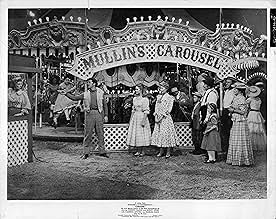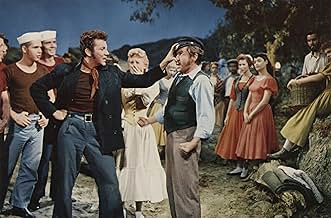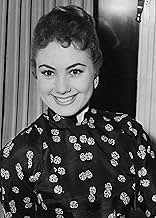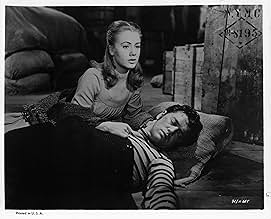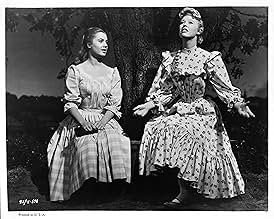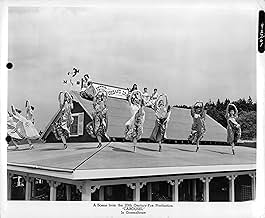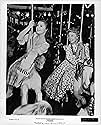Carousel
- 1956
- Tous publics
- 2h 8m
IMDb RATING
6.5/10
7.1K
YOUR RATING
Fifteen years after his death, a carousel barker is granted permission to return to Earth for one day to make amends to his widow and their daughter.Fifteen years after his death, a carousel barker is granted permission to return to Earth for one day to make amends to his widow and their daughter.Fifteen years after his death, a carousel barker is granted permission to return to Earth for one day to make amends to his widow and their daughter.
- Awards
- 1 win & 3 nominations total
William LeMassena
- Heavenly Friend
- (as William Le Massena)
Jacques d'Amboise
- Louise's 'Starlight Carnival' Dancing Partner
- (as Jacques D'Amboise)
Walter Bacon
- Graduation Spectator
- (uncredited)
Robert Banas
- Ruffian in Louise's Ballet
- (uncredited)
Tex Brodus
- Townsman
- (uncredited)
Buddy Bryan
- Dancer
- (uncredited)
Bob Calder
- Dancer
- (uncredited)
Harry Carter
- Third Policeman
- (uncredited)
Featured reviews
In recent years it has become commonplace to site Frank Kapra's `It's a Wonderful Life' as one of the greatest films ever. It has become a Christmas tradition. I feel that film is overrated. The problem I have with it is that it stacks the deck in trying to convince us of the value of human life. George Bailey is a successful banker- not exactly rich but successful enough that he contributed a lot of material things to people's lives, including a housing development named after him. He also saved his brother's life so his brother could save the men on that ship, etc. etc. The message is that you are of value if you have done the sort of things they build statues of people to honor. On top of that, without George, everybody in this town is nothing. They are all drunks or crooks or prostitutes. They have no capabilities of their own. They are all dependent on George Bailey.
I much prefer Carousel, whose hero is a bum. If you were to ask nearly everybody in town- a town that has done just fine without him, as a matter of fact, what Billy Bigelow contributed to their lives, they would say nothing- if they remembered him at all. The only people who would have anything good to say about him are those that he loved and who loved him. And that is the bottom line. If a person can be redeemed by his ability to love and to inspire love in others, we all have a chance. If you have to have a bank and town named after you, the bar is too high for most of us.
As a musical, this is as good as it gets. `If I loved you' is rivaled only by `Some Enchanted Evening' as a love song and it means more as it's revealing of the character of this crude man who can't express what's in his soul and this shy girl who wants only to love and be loved. `Soliloquy' is the dramatic highlight in the history of the musical as Billy works out all his hopes and dreams in his mind and vows to do anything he can to make his daughter's life special. By over reaching his bounds, he does the opposite. `What's the Use of Wondering' expresses the doubts anyone entering a relationship has and is doubly moving as it's sung by Julie, for whom we know the song will have special relevance. `When You Walk Through a Storm' offers hope to us all. Those old guys at graduations are really worth listening to.
I much prefer Carousel, whose hero is a bum. If you were to ask nearly everybody in town- a town that has done just fine without him, as a matter of fact, what Billy Bigelow contributed to their lives, they would say nothing- if they remembered him at all. The only people who would have anything good to say about him are those that he loved and who loved him. And that is the bottom line. If a person can be redeemed by his ability to love and to inspire love in others, we all have a chance. If you have to have a bank and town named after you, the bar is too high for most of us.
As a musical, this is as good as it gets. `If I loved you' is rivaled only by `Some Enchanted Evening' as a love song and it means more as it's revealing of the character of this crude man who can't express what's in his soul and this shy girl who wants only to love and be loved. `Soliloquy' is the dramatic highlight in the history of the musical as Billy works out all his hopes and dreams in his mind and vows to do anything he can to make his daughter's life special. By over reaching his bounds, he does the opposite. `What's the Use of Wondering' expresses the doubts anyone entering a relationship has and is doubly moving as it's sung by Julie, for whom we know the song will have special relevance. `When You Walk Through a Storm' offers hope to us all. Those old guys at graduations are really worth listening to.
The dark, brooding Rodgers & Hammerstein stage musical gets the big-budget screen treatment in this 1956 release, and the results are only moderately successful. The actors have great voices -- and certainly the score to "Carousel" is the lushest and densest R&H produced -- but they're simply not good enough actors to explore the depths of the musical's book. Gordon MacRae and Shirley Jones were fine as perky country folk in "Oklahoma!" from a year earlier, but MacRae is not a dangerous enough presence to pull off the rough character of Billy Bigelow.
Still, as mentioned, the score sounds wonderful and remains mostly intact for the film. And Agnes DeMille provides some characteristically stunning screen choreography, especially in the trademark R&H ballet sequence.
Grade: B
Still, as mentioned, the score sounds wonderful and remains mostly intact for the film. And Agnes DeMille provides some characteristically stunning screen choreography, especially in the trademark R&H ballet sequence.
Grade: B
The film of this classic musical is a joy to watch and listen to.
The music is undoubtedly the finest Rodgers and Hammerstein
score.
Of the many fine moments in the film two astounding highlights
must be Billy's Soliloquy and the Shirley Jones' and Gordon
MacRae's lover's duet "If I loved you".
To this is added two great ballet sequences "June is Bustin' out all
Over" and Louise's ballet.
The film is Rogers and Hammerstein at their most dark and
introspective, which may account for the film's relatively lacklustre
reception at the time of its initial release but the at the same time
explains the ongoing appeal of this truly timeless classic film.
It is a fine memorial to both composer and lyricist and to the
artistry of Gordon MacRae whose performance of the soliloquy is
the benchmark against which all performances are judged.
The film was produced in Cinemascope 55 a large film fomat
which overcame many of the problems that were inherent in early
Cinemascope films (even though the film was actually released
only in standard 35mm form ..a bit like a 35mm print of a 70mm
film this still results in a far better image) and gives the film its
immaculate look.
The Fox DVD is crisp and the sound, though very clearly a 1950s
recording is clean and well balanced.
I just wish I could see this film in a cinema on the biggest of
screens... it would be an even more special experience!
The music is undoubtedly the finest Rodgers and Hammerstein
score.
Of the many fine moments in the film two astounding highlights
must be Billy's Soliloquy and the Shirley Jones' and Gordon
MacRae's lover's duet "If I loved you".
To this is added two great ballet sequences "June is Bustin' out all
Over" and Louise's ballet.
The film is Rogers and Hammerstein at their most dark and
introspective, which may account for the film's relatively lacklustre
reception at the time of its initial release but the at the same time
explains the ongoing appeal of this truly timeless classic film.
It is a fine memorial to both composer and lyricist and to the
artistry of Gordon MacRae whose performance of the soliloquy is
the benchmark against which all performances are judged.
The film was produced in Cinemascope 55 a large film fomat
which overcame many of the problems that were inherent in early
Cinemascope films (even though the film was actually released
only in standard 35mm form ..a bit like a 35mm print of a 70mm
film this still results in a far better image) and gives the film its
immaculate look.
The Fox DVD is crisp and the sound, though very clearly a 1950s
recording is clean and well balanced.
I just wish I could see this film in a cinema on the biggest of
screens... it would be an even more special experience!
"Carousel" is the musical version of the old film "Liliom"--a story that was filmed many times since 1919. While I've not seen either silent version, I have seen the Frank Borzage version (1930) and the French language version by Fritz Lang (1934). I wasn't impressed by either of these films--mostly because the leading character was pretty despicable. He's a very selfish character who horribly mistreats his poor wife--and I wonder how they can make this a romance with such a horrible guy, as it severely undermines the story. So, "Carousel" begins with a major handicap, as hating the leading character makes it hard to fall in love with the film.
The film begins in New England. A very impressionable young lady (Shirley Jones) sees a handsome rogue (Gordon MacRae) at the carnival and the two inexplicably fall in love and decide to marry. I say inexplicably because he is a real womanizer and NOT the type to ever settle down. As for the marriage, it is a disaster--mostly because he is a ne'er-do'-well who is afraid to work or commit himself to his lovely wife. At times, such as when he learns he's about to become a father, he commits to changing but invariably he ends up returning to his old ways. Now I was a bit uncomfortable about this, as he apparently slapped his bride around--but they made LOTS of excuses for it, such as saying 'he's under a lot of pressure' or 'I only hit her once'! So much for a film that will empower the women in the audience! I just couldn't get past the fact he was a jerk who died while trying to rob someone!
This story is apparently all part of some flashback. You see, MacRae's character is dead and he's telling this to the head honcho up in Heaven because he wants permission to return for one and only one brief period. Now considering most of the flashback consists of him acting like a clod, you wonder how this is all going to convince the powers that be to grant his request!
As for the music, it's decent but the film clearly lacks the crowd-pleasing tunes of many of Rogers and Hammerstein's other works. "South Pacific", "Oklahoma" and the rest had more memorable songs--and didn't have to work so hard to compensate for an unlikable lead. Here, it's an uphill battle. Pretty, well made...but still a film that I had a hard time liking. Overall, it looks good but fails. Watchable but among the least in the Rogers and Hammerstein canon.
The film begins in New England. A very impressionable young lady (Shirley Jones) sees a handsome rogue (Gordon MacRae) at the carnival and the two inexplicably fall in love and decide to marry. I say inexplicably because he is a real womanizer and NOT the type to ever settle down. As for the marriage, it is a disaster--mostly because he is a ne'er-do'-well who is afraid to work or commit himself to his lovely wife. At times, such as when he learns he's about to become a father, he commits to changing but invariably he ends up returning to his old ways. Now I was a bit uncomfortable about this, as he apparently slapped his bride around--but they made LOTS of excuses for it, such as saying 'he's under a lot of pressure' or 'I only hit her once'! So much for a film that will empower the women in the audience! I just couldn't get past the fact he was a jerk who died while trying to rob someone!
This story is apparently all part of some flashback. You see, MacRae's character is dead and he's telling this to the head honcho up in Heaven because he wants permission to return for one and only one brief period. Now considering most of the flashback consists of him acting like a clod, you wonder how this is all going to convince the powers that be to grant his request!
As for the music, it's decent but the film clearly lacks the crowd-pleasing tunes of many of Rogers and Hammerstein's other works. "South Pacific", "Oklahoma" and the rest had more memorable songs--and didn't have to work so hard to compensate for an unlikable lead. Here, it's an uphill battle. Pretty, well made...but still a film that I had a hard time liking. Overall, it looks good but fails. Watchable but among the least in the Rogers and Hammerstein canon.
I have had the relatively rare privilege of performing "Carousel" on stage, uncut, and with a full orchestra. The original "Carousel" that Rodgers and Hammerstein wrote for the stage is practically an opera, employing extended musical scenes that cover great stretches of plot and character by alternating music and dialogue. When one sees the "Carousel" on stage (with good voices and the original orchestrations), one begins to understand why this is considered one of the greatest musicals ever written.
"Carousel" on film is not nearly as overwhelming. The story is still there, as are the songs, for the most part. But they are just songs in the movie, scenes distilled to the bare bones of the melody on which the original sequence was based. You don't get the feeling, after hearing them sung, that you have learned anything new about the characters (excepting, of course, Billy Bigelow's "Soliloquy" which is left entirely intact).
For example, the "If I Loved You" bench scene between Julie Jordan (Shirley Jones) and Billy Bigelow (Gordon MacRae) lasts almost fifteen minutes once the music starts. What the characters don't tell us about themselves, the music does, throwing melodies left and right until it finally culminates in the release of the famous love song. The scene has built up to this moment until it becomes the only way that Julie can tell Billy that she loves him. In the movie, however, it is all talk until Julie starts singing "If I Loved You". The song seems to come much more out of left field and does not seem nearly as satisfying. Billy repeats the song and the scene ends. As a result, their falling in love with each other doesn't make much sense because the scene really hasn't built up to it.
Several songs which delineate the supporting characters are either severely truncated (such as the musical/character sequence between Carrie Pipperidge (Barbara Ruick) and Enoch Snow (Robert Rounseville)) or cut entirely (such as "Blow High, Blow Low" which could have been a choreographer's dream). As for the choreography itself, surely "June is Bustin' Out All Over" could have been staged with a little more imagination instead of confining itself to the roof and deck of Nettie Fowler's spa. And it does feel confined. This is a song about abandoning the human spirit to the glories of the summer season, a feeling that covers much more territory than just a dining patio.
I do like the casting in the film, although I believe that they were badly underdirected. Gordon MacRae and Shirley Jones seem a little lost here. Their talent is not in question as evidenced by their stellar performances in the movie version of "Oklahoma!". Clearly this movie, which had the potential to be a cinema classic, was helmed by someone who didn't understand the genius of Rodgers and Hammerstein. In other words, don't try to fix what ain't broke.
"Carousel" on film is not nearly as overwhelming. The story is still there, as are the songs, for the most part. But they are just songs in the movie, scenes distilled to the bare bones of the melody on which the original sequence was based. You don't get the feeling, after hearing them sung, that you have learned anything new about the characters (excepting, of course, Billy Bigelow's "Soliloquy" which is left entirely intact).
For example, the "If I Loved You" bench scene between Julie Jordan (Shirley Jones) and Billy Bigelow (Gordon MacRae) lasts almost fifteen minutes once the music starts. What the characters don't tell us about themselves, the music does, throwing melodies left and right until it finally culminates in the release of the famous love song. The scene has built up to this moment until it becomes the only way that Julie can tell Billy that she loves him. In the movie, however, it is all talk until Julie starts singing "If I Loved You". The song seems to come much more out of left field and does not seem nearly as satisfying. Billy repeats the song and the scene ends. As a result, their falling in love with each other doesn't make much sense because the scene really hasn't built up to it.
Several songs which delineate the supporting characters are either severely truncated (such as the musical/character sequence between Carrie Pipperidge (Barbara Ruick) and Enoch Snow (Robert Rounseville)) or cut entirely (such as "Blow High, Blow Low" which could have been a choreographer's dream). As for the choreography itself, surely "June is Bustin' Out All Over" could have been staged with a little more imagination instead of confining itself to the roof and deck of Nettie Fowler's spa. And it does feel confined. This is a song about abandoning the human spirit to the glories of the summer season, a feeling that covers much more territory than just a dining patio.
I do like the casting in the film, although I believe that they were badly underdirected. Gordon MacRae and Shirley Jones seem a little lost here. Their talent is not in question as evidenced by their stellar performances in the movie version of "Oklahoma!". Clearly this movie, which had the potential to be a cinema classic, was helmed by someone who didn't understand the genius of Rodgers and Hammerstein. In other words, don't try to fix what ain't broke.
Did you know
- TriviaThe film was not successful at the box office despite the positive reviews, but the soundtrack album became a national best seller.
- GoofsAbout one hour into the film, Billy Bigelow (Gordon MacRae) sings the "My Boy Bill" soliloquy on the beach. At one minute, seventeen seconds into the song, four jets fly over in formation in the upper left of the frame. This scene was filmed on the beach near Paradise Cove, Malibu, California, in 1955, when there were several operating Navy and Marine military bases in southern California.
- Crazy creditsA star hurtles downward and explodes in mid-air; out of this appears the credit "Twentieth Century-Fox presents Rodgers and Hammerstein's Carousel". The other credits all appear in a straightforward fashion.
- Alternate versionsIn the film's first two telecasts on ABC-TV in 1966, Mrs. Mullin's line "I don't run my business for a lot of sluts." followed by Carrie's retort "Who you calling a slut? Slut yourself!" and Julie says "Yeah, slut yourself!" was edited out. The line was kept on all local station telecasts of the film, and on all video releases.
- ConnectionsFeatured in King of the Movies (1978)
- SoundtracksThe Carousel Waltz
(1945) (uncredited)
Music by Richard Rodgers
Performed by the 20th Century-Fox Studio Orchestra Conducted by Alfred Newman
Details
- Release date
- Country of origin
- Language
- Also known as
- Rodgers and Hammerstein's Carousel
- Filming locations
- Boothbay Harbor, Maine, USA(scenes outside Nettie's Spa and in marina, including musical numbers "June Is Bustin' Out All Over" and "When The Children Are Asleep")
- Production company
- See more company credits at IMDbPro
Box office
- Gross worldwide
- $1,104
- Runtime
- 2h 8m(128 min)
- Color
- Aspect ratio
- 2.55 : 1
Contribute to this page
Suggest an edit or add missing content




